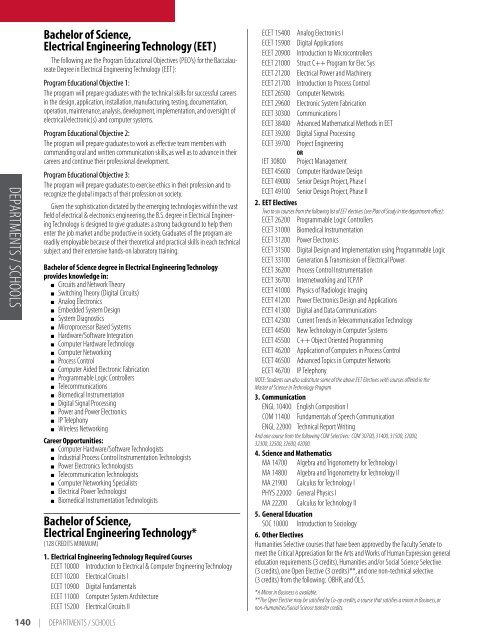Download - Purdue University Calumet
Download - Purdue University Calumet
Download - Purdue University Calumet
You also want an ePaper? Increase the reach of your titles
YUMPU automatically turns print PDFs into web optimized ePapers that Google loves.
departments / schools<br />
Bachelor of Science,<br />
Electrical Engineering Technology (EET)<br />
The following are the Program Educational Objectives (PEO’s) for the Baccalaureate<br />
Degree in Electrical Engineering Technology (EET):<br />
Program Educational Objective 1:<br />
The program will prepare graduates with the technical skills for successful careers<br />
in the design, application, installation, manufacturing, testing, documentation,<br />
operation, maintenance, analysis, development, implementation, and oversight of<br />
electrical/electronic(s) and computer systems.<br />
Program Educational Objective 2:<br />
The program will prepare graduates to work as effective team members with<br />
commanding oral and written communication skills, as well as to advance in their<br />
careers and continue their professional development.<br />
Program Educational Objective 3:<br />
The program will prepare graduates to exercise ethics in their profession and to<br />
recognize the global impacts of their profession on society.<br />
Given the sophistication dictated by the emerging technologies within the vast<br />
field of electrical & electronics engineering, the B.S. degree in Electrical Engineering<br />
Technology is designed to give graduates a strong background to helpthem<br />
enter the job market and be productive in society. Graduates of the program are<br />
readily employable because of their theoretical and practical skills in each technical<br />
subject and their extensive hands-on laboratory training.<br />
Bachelor of Science degree in Electrical Engineering Technology<br />
provides knowledge in:<br />
Circuits and Network Theory<br />
Switching Theory (Digital Circuits)<br />
Analog Electronics<br />
Embedded System Design<br />
System Diagnostics<br />
Microprocessor Based Systems<br />
Hardware/Software Integration<br />
Computer Hardware Technology<br />
Computer Networking<br />
Process Control<br />
Computer Aided Electronic Fabrication<br />
Programmable Logic Controllers<br />
Telecommunications<br />
Biomedical Instrumentation<br />
Digital Signal Processing<br />
Power and Power Electronics<br />
IP Telephony<br />
Wireless Networking<br />
Career Opportunities:<br />
Computer Hardware/Software Technologists<br />
Industrial Process Control Instrumentation Technologists<br />
Power Electronics Technologists<br />
Telecommunication Technologists<br />
Computer Networking Specialists<br />
Electrical Power Technologist<br />
Biomedical Instrumentation Technologists<br />
Bachelor of Science,<br />
Electrical Engineering Technology*<br />
(128 credits minimum)<br />
1. Electrical Engineering Technology Required Courses<br />
ECET 10000 Introduction to Electrical & Computer Engineering Technology<br />
ECET 10200 Electrical Circuits I<br />
ECET 10900 Digital Fundamentals<br />
ECET 11000 Computer System Architecture<br />
ECET 15200 Electrical Circuits II<br />
140 | departments / schools<br />
ECET 15400 Analog Electronics I<br />
ECET 15900 Digital Applications<br />
ECET 20900 Introduction to Microcontrollers<br />
ECET 21000 Struct C++ Program for Elec Sys<br />
ECET 21200 Electrical Power and Machinery<br />
ECET 21700 Introduction to Process Control<br />
ECET 26500 Computer Networks<br />
ECET 29600 Electronic System Fabrication<br />
ECET 30300 Communications I<br />
ECET 38400 Advanced Mathematical Methods in EET<br />
ECET 39200 Digital Signal Processing<br />
ECET 39700 Project Engineering<br />
OR<br />
IET 30800 Project Management<br />
ECET 45600 Computer Hardware Design<br />
ECET 49000 Senior Design Project, Phase I<br />
ECET 49100 Senior Design Project, Phase II<br />
2. EET Electives<br />
Twotosix courses fromthe following list of EET electives (see Plan of Study in the department office):<br />
ECET 26200 Programmable Logic Controllers<br />
ECET 31000 Biomedical Instrumentation<br />
ECET 31200 Power Electronics<br />
ECET 31500 Digital Design and Implementation using Programmable Logic<br />
ECET 33100 Generation & Transmission of Electrical Power<br />
ECET 36200 Process Control Instrumentation<br />
ECET 36700 Internetworking and TCP/IP<br />
ECET 41000 Physics of Radiologic Imaging<br />
ECET 41200 Power Electronics Design and Applications<br />
ECET 41300 Digital and Data Communications<br />
ECET 42300 Current Trends in Telecommunication Technology<br />
ECET 44500 NewTechnology in Computer Systems<br />
ECET 45500 C++ Object Oriented Programming<br />
ECET 46200 Application of Computers in Process Control<br />
ECET 46500 Advanced Topics in Computer Networks<br />
ECET 46700 IP Telephony<br />
NOTE: Students can alsosubstitute some of the above EET Electives with courses offered in the<br />
Master of Science in Technology Program<br />
3. Communication<br />
ENGL 10400 English Composition I<br />
COM 11400 Fundamentals of Speech Communication<br />
ENGL 22000 Technical Report Writing<br />
And one course fromthe following COMSelectives: COM30700, 31400, 31500, 32000,<br />
32300, 32500, 32600, 42000.<br />
4. Science and Mathematics<br />
MA 14700 Algebra and Trigonometry for Technology I<br />
MA 14800 Algebra and Trigonometry for Technology II<br />
MA 21900 Calculus for Technology I<br />
PHYS 22000 General Physics I<br />
MA 22200 Calculus for Technology II<br />
5. General Education<br />
SOC 10000 Introduction to Sociology<br />
6. Other Electives<br />
Humanities Selective courses that have been approved by the Faculty Senate to<br />
meet the Critical Appreciation for the Arts and Works of Human Expression general<br />
education requirements (3 credits), Humanities and/or Social Science Selective<br />
(3 credits), one Open Elective (3 credits)**, and one non-technical selective<br />
(3 credits) from the following: OBHR, and OLS.<br />
*A Minor in Business is available.<br />
**The Open Elective may be satisfied by Co-op credits, a course that satisfies a minor in Business, or<br />
non-Humanities/Social Science transfer credits.

















